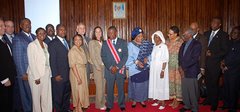
(FrontpageAfrica)
His big hits, “Who Knock on My Wife” and “Baboon wants to become President” are huge party poppers at many Liberian gatherings and parties, but Sundaygar Dearboy is taking it all in stride as he wraps up his first tour of the U.S.
Dear boy, currently on tour in the United States arrived on the scene in 2004 with and the hit song has been widely received. ”In fact that’s what brought me up and everybody began to fall in love with it,” says Dearboy. This weekend, the Liberia’s Entertainer of the Year will rock Detroit in his final appearance at the Liberian Hall.
“The tour has been tremendous so far and we are getting ready for his farewell concert in Detroit this weekend,” says Emmanuel Toe, Dearboy’s promoter. “The outpour has been tremendous, especially wonderful.” Toe says many of those who attended Dearboy’s last concert in Maryland were left craving for more from the artist who is rapidly making waves among Liberians in the Diaspora and back home.
In terms of success of the tour, Dearboy says he has been around a lot of cities and people have embraced him with open arms as they sing and dance to his pulsating sounds. ”The tour was basically intended to introduce myself and my music to the Diaspora audience and making sure that musicians back home reap the benefits of their labor and this is the kind of tour I’m trying to do. I’m receiving a lot of good vibes.”
This week, Dearboy hopes to become the first local Liberian artist to film a music video – of the hit song, “Who Knock on My Wife”. “This is the first time a Local Liberian musician would be doing the video. The live shoot is planned for the concert on Saturday,” says Toe. Later this year, Dearboy will headline a Liberian Music festival along with the LIB Queen.
Word-of-mouth about Dearboy’s sold-out tours is generating calls from several Liberian communities in the U.S. Says Toe, “the Liberian community has been very helpful. Rhodes Island, Minnesota, Dallas, Atlanta and other places have come knocking on our doors, hoping to get Dearboy to perform in their area.
For Dearboy, the success of his tour has convinced him that the sky is the limit. “What one man can do, everyone is capable of doing but what no man can do, no man dreams about it. The final destination may be far from you, but we are all going there. You can make sure you realize your dream. With the help of Emmanuel Toe and other Liberians in the U.S., everything is going on well and we are making sure that we make a lasting impact on our people. We have to realize that we can make life better for our people. Keep your heads up high and I will never disappointment you, I will always come out with more hits to excite my fans but beyond that we have to build an institution that will recognize the talents of Liberians.”
”The message basically is how we can all live together. These songs basically speak of the ills of our culture and how we can address them. When it comes to promoting unity and peace in the sub-region, I believe my music has done a lot.”
Sundaygar Dearboy, Liberian MusicianDearboy says the motivation for the hit song,” Who Knock on My Wife” came as a result of the war which resulted into forceful marriage and abuse of women. “Thus, I decided to come out with that song as a song decrying the many ills in our society with respect to the situation I just mentioned to you, with the hopes and aspiration that people will related to it.”
Dearboy says his thought process was right as a lot of people have identified with the song. As a result of the war, many husbands and wives went their separate ways; the sanctity of marriage went out the door as many fell prey to one of the unheralded problems of the war. “A lot of people men came and told me how their women were taken away from them, not by way of arms but by other people coming around and taking their women because they had the upper hand. Others women left them because of peer pressure but it was not only limited to women. The equilibrium was created with men leaving their wives as well. So it was well accepted,”
Says Dearboy.
The singer says while he hasn’t really written a song that spoke against violence against women, “Who knock on my wife” is an exceptional tribute to a problem that plagued many families during the fourteen-year civil war.
His focus, he says has been singing songs that promote the heritage and culture or the Liberian environment and Africa as a whole. ”The message basically is how we can all live together. These songs basically speak of the ills of our culture and how we can address them. When it comes to promoting unity and peace in the sub-region, I believe my music has done a lot.”
Currently, Dearboy says he’s working along with the New Vision, Toe and entertainment organizer, Junda Morris and making sure that Liberians back home are benefited in so many ways. “As a matter of fact, Dearboy says while in the U.S., he visited the first black CD, DVD center in the U.S. where he was able to talk to owners and encourage them to go and invest in Liberia so that the sales of CDs and duplication won’t give us hard time as it is doing now. “They expressed concern and they will be going as a matter of fact in May to make an assessment. So those were some of the successfulness of my trip here. Though, I’m a businessman, I’m not involved in mining or other things but I’ve met other people who have expressed interests with respect to how I talk with them.”
Dearboy’s music has already caught the interest of some businesses in the U.S. Maurice Morton, a U.S. attorney and entrepreneur says he was overwhelmed by Dearboy’s music and personality and is planning an assessment team to Liberia shortly.
“I actually met with him last week. Some partners and I we actually have a strong interest in going to Liberia and helping out anyway we can. We met with his folks here and we’re trying to look at some of the opportunities and ways we can actually get African-Americans over there to see how we can help whether it is to invest or do business,” says Morton.
Morton says when Dearboy came in town he met with him and his partners and told them about some of the opportunities in Liberia - “and then he also brought his music. His music is outstanding, his message is outstanding.”
As a result, Morton says he is making efforts to get Dearboy’s out there and at the same time try to let people know about the opportunities in Liberia. “We should go back and invest in our own land as supposed to others going over. So that’s how we came across. We have a lot of the same interests so we want to help each other out.”
Maurice says he and his team hopes to be in Monrovia by April on an assessment mission.
“The main point of the first visit, Morton says is hopefully to meet with some government officials, take a look at the land and opportunities and see what the needs are and see how we can help be it infrastructure needs or whatever the needs may be, we can help bridge that gap and the connection between black-owned businesses in Liberia .”
As one of the few Liberian artists who weathered the storm and stayed in Liberia throughout the war, Dearboy has used his music to plea to Liberians to exercise patience with the young government of President Ellen Johnson-Sirleaf.
The result is “Manage it “Like That Papa Will Soon Come,” an up tempo-style sound that covers Sirleaf’s inauguration day lament when she spotlighted the hardships many Liberians face in making ends meet.
“As you know, in our various communities and towns, our children have a way of greeting their fathers when they come home after a long, tiring day of trying to find the means to feed the family that night and send the children to school in the morning.
They say, "Papa na come." For too many times, for too many families, Papa comes home with nothing, having failed to find a job or to get the help to feed the hungry children. Imagine the disappointment and the hurt in the mother and the children; the frustration and the loss of self-confidence in the father.”Through the message of this story, Sirleaf said she wanted Liberians to know that she understood their plight.
“This is a song model after a phrase in President Ellen Johnson-Sirleaf’s inauguration when she spoke of government recognizing the livelihood of the people to be improved and during her administration she will make sure that papa comes.”
Dearboy says a lot of people are expecting papa to come right away when the government took over within two months time but some of the expectations may be unfair to the young government presiding over a country emerging from war. “I feel that as a musician disseminating information through songs I have an obligation to sensitize the public, manage it like that, Papa will soon come.”



